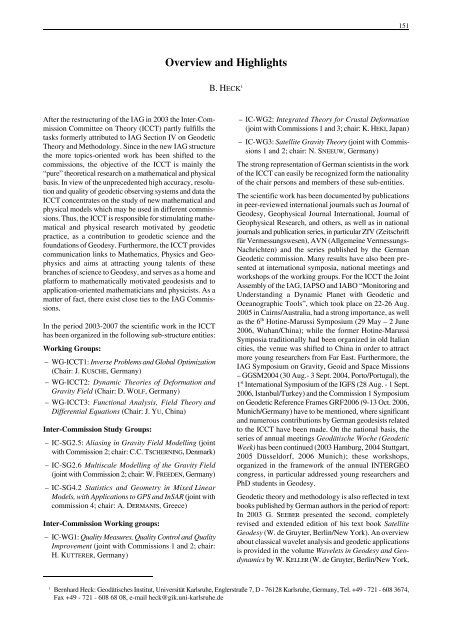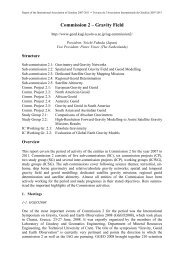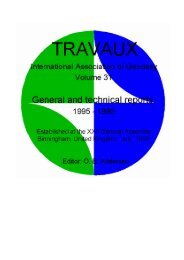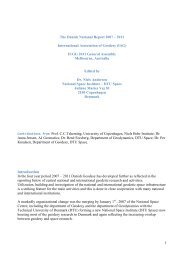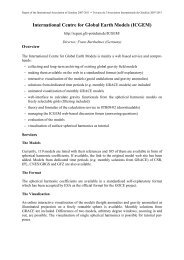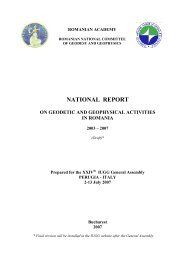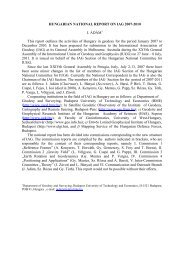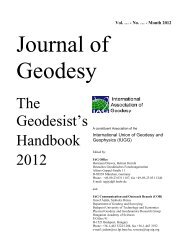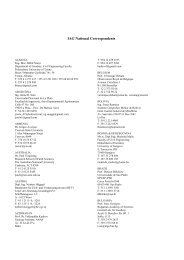NATIONAL REPORT OF THE FEDERAL REPUBLIC OF ... - IAG Office
NATIONAL REPORT OF THE FEDERAL REPUBLIC OF ... - IAG Office
NATIONAL REPORT OF THE FEDERAL REPUBLIC OF ... - IAG Office
You also want an ePaper? Increase the reach of your titles
YUMPU automatically turns print PDFs into web optimized ePapers that Google loves.
After the restructuring of the <strong>IAG</strong> in 2003 the Inter-Commission<br />
Committee on Theory (ICCT) partly fulfills the<br />
tasks formerly attributed to <strong>IAG</strong> Section IV on Geodetic<br />
Theory and Methodology. Since in the new <strong>IAG</strong> structure<br />
the more topics-oriented work has been shifted to the<br />
commissions, the objective of the ICCT is mainly the<br />
“pure” theoretical research on a mathematical and physical<br />
basis. In view of the unprecedented high accuracy, resolution<br />
and quality of geodetic observing systems and data the<br />
ICCT concentrates on the study of new mathematical and<br />
physical models which may be used in different commissions.<br />
Thus, the ICCT is responsible for stimulating mathematical<br />
and physical research motivated by geodetic<br />
practice, as a contribution to geodetic science and the<br />
foundations of Geodesy. Furthermore, the ICCT provides<br />
communication links to Mathematics, Physics and Geophysics<br />
and aims at attracting young talents of these<br />
branches of science to Geodesy, and serves as a home and<br />
platform to mathematically motivated geodesists and to<br />
application-oriented mathematicians and physicists. As a<br />
matter of fact, there exist close ties to the <strong>IAG</strong> Commissions.<br />
In the period 2003-2007 the scientific work in the ICCT<br />
has been organized in the following sub-structure entities:<br />
Working Groups:<br />
– WG-ICCT1: Inverse Problems and Global Optimization<br />
(Chair: J. KUSCHE, Germany)<br />
– WG-ICCT2: Dynamic Theories of Deformation and<br />
Gravity Field (Chair: D. WOLF, Germany)<br />
– WG-ICCT3: Functional Analysis, Field Theory and<br />
Differential Equations (Chair: J. YU, China)<br />
Inter-Commission Study Groups:<br />
– IC-SG2.5: Aliasing in Gravity Field Modelling (joint<br />
with Commission 2; chair: C.C. TSCHERNING, Denmark)<br />
– IC-SG2.6 Multiscale Modelling of the Gravity Field<br />
(joint with Commission 2; chair: W. FREEDEN, Germany)<br />
– IC-SG4.2 Statistics and Geometry in Mixed Linear<br />
Models, with Applications to GPS and InSAR (joint with<br />
commission 4; chair: A. DERMANIS, Greece)<br />
Inter-Commission Working groups:<br />
–IC-WG1: Quality Measures, Quality Control and Quality<br />
Improvement (joint with Commissions 1 and 2; chair:<br />
H. KUTTERER, Germany)<br />
Overview and Highlights<br />
B. HECK 1<br />
1 Bernhard Heck: Geodätisches Institut, Universität Karlsruhe, Englerstraße 7, D - 76128 Karlsruhe, Germany, Tel. +49 - 721 - 608 3674,<br />
Fax +49 - 721 - 608 68 08, e-mail heck@gik.uni-karlsruhe.de<br />
151<br />
–IC-WG2: Integrated Theory for Crustal Deformation<br />
(joint with Commissions 1 and 3; chair: K. HEKI, Japan)<br />
–IC-WG3: Satellite Gravity Theory (joint with Commissions<br />
1 and 2; chair: N. SNEEUW, Germany)<br />
The strong representation of German scientists in the work<br />
of the ICCT can easily be recognized form the nationality<br />
of the chair persons and members of these sub-entities.<br />
The scientific work has been documented by publications<br />
in peer-reviewed international journals such as Journal of<br />
Geodesy, Geophysical Journal International, Journal of<br />
Geophysical Research, and others, as well as in national<br />
journals and publication series, in particular ZfV (Zeitschrift<br />
für Vermessungswesen), AVN (Allgemeine Vermessungs-<br />
Nachrichten) and the series published by the German<br />
Geodetic commission. Many results have also been presented<br />
at international symposia, national meetings and<br />
workshops of the working groups. For the ICCT the Joint<br />
Assembly of the <strong>IAG</strong>, IAPSO and IABO “Monitoring and<br />
Understanding a Dynamic Planet with Geodetic and<br />
Oceanographic Tools”, which took place on 22-26 Aug.<br />
2005 in Cairns/Australia, had a strong importance, as well<br />
as the 6th Hotine-Marussi Symposium (29 May – 2 June<br />
2006, Wuhan/China); while the former Hotine-Marussi<br />
Symposia traditionally had been organized in old Italian<br />
cities, the venue was shifted to China in order to attract<br />
more young researchers from Far East. Furthermore, the<br />
<strong>IAG</strong> Symposium on Gravity, Geoid and Space Missions<br />
– GGSM2004 (30 Aug.- 3 Sept. 2004, Porto/Portugal), the<br />
1st International Symposium of the IGFS (28 Aug. - 1 Sept.<br />
2006, Istanbul/Turkey) and the Commission 1 Symposium<br />
on Geodetic Reference Frames GRF2006 (9-13 Oct. 2006,<br />
Munich/Germany) have to be mentioned, where significant<br />
and numerous contributions by German geodesists related<br />
to the ICCT have been made. On the national basis, the<br />
series of annual meetings Geodätische Woche (Geodetic<br />
Week) has been continued (2003 Hamburg, 2004 Stuttgart,<br />
2005 Düsseldorf, 2006 Munich); these workshops,<br />
organized in the framework of the annual INTERGEO<br />
congress, in particular addressed young researchers and<br />
PhD students in Geodesy.<br />
Geodetic theory and methodology is also reflected in text<br />
books published by German authors in the period of report:<br />
In 2003 G. SEEBER presented the second, completely<br />
revised and extended edition of his text book Satellite<br />
Geodesy (W. de Gruyter, Berlin/New York). An overview<br />
about classical wavelet analysis and geodetic applications<br />
is provided in the volume Wavelets in Geodesy and Geodynamics<br />
by W. KELLER (W. de Gruyter, Berlin/New York,


